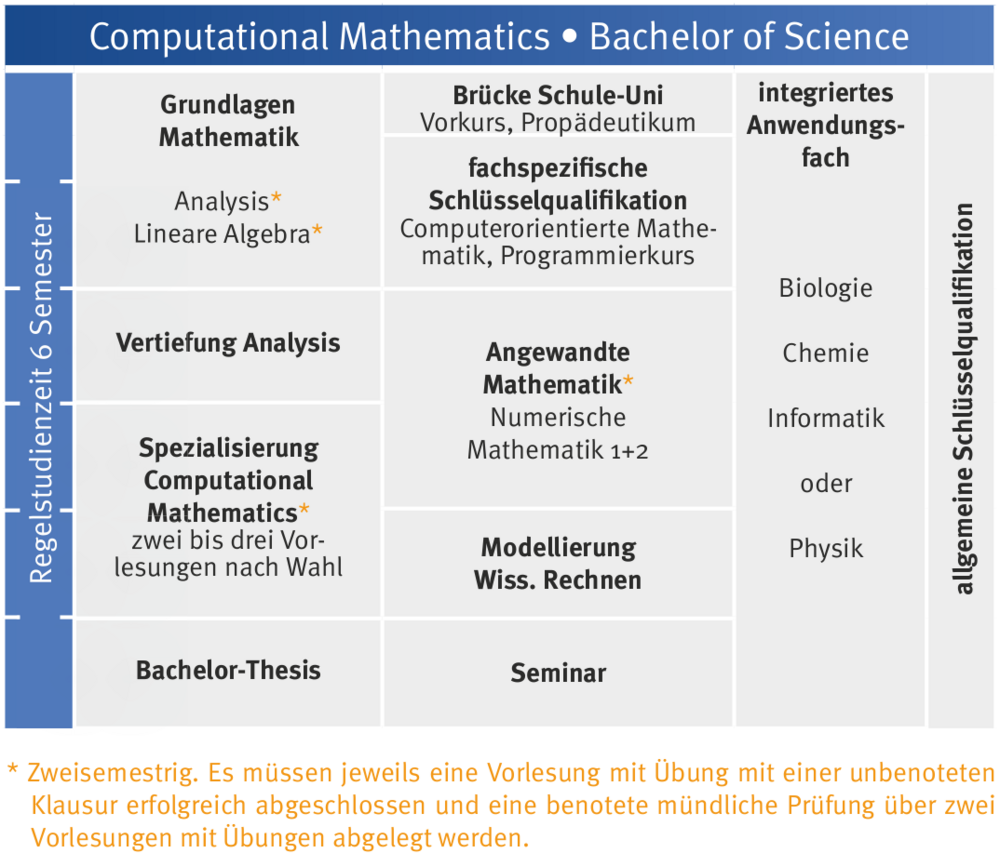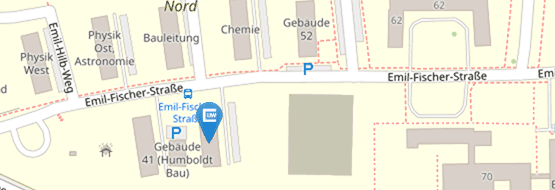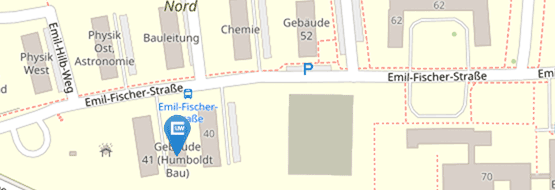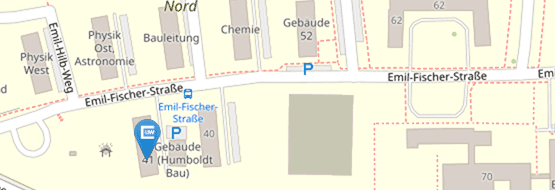Computational Mathematics (Bachelor)

Bachelor degree program of Computational Mathematics
| Degree: | Bachelor of Science |
| Standard length of program | 6 Semester |
| Study beginning: | to be discontinued as of winter semester 2022/2023 (to be replaced by Bachelor Mathematical Data Science) |
| Prerequisite: | free admission |
| Credits: | 180 ECTS credits |
| Target group: | students who want to study mathematics with orientated application towards natural and engineering sciences |
| Qualification targets: | Qualification targets Bachelor Computational Mathematics (180 ECTS) |
| Accreditation: | program accredited till September 30, 2028 |
Any student interested in graduating in Computational Mathematics should
- become familiar with the typical methods of mathematical reasoning,
- acquire comprehensive knowledge of the methods of applied mathematics,
- acquire competence in the development of problem-solving strategies,
- develop the ability to structure complex relationships and apply mathematical methods and algorithms to problems.
A study of Computational Mathematics promotes the
- ability related to abstract thinking,
- skills in addressing complex issues,
- perseverance and creativity in solving problems.
Mathematicians easily achieve good career prospects, both in situation of economic stability and difficulties. According to STERN, "the entire unemployed mathematicians in Germany would at most fill a bus". A degree in mathematics attests to the ability of the graduates (whether Mathematics, Financial Mathematics, Computational Mathematics or Mathematical Physics). Indeed mathematicians
- are able to work within complex contexts quite quickly,
- identify the core of a problem and separate what is not essential,
- find creative solutions,
- use profound mathematical expertise and techniques that are not typical of graduates of other programs.
All these characteristics combined with visible knowledge of the needs of the "mathematics users" results in the entry ticket to a crisis-proof workplace. Indeed mathematicians can integrate several applied subjects in mathematics for the sector of economics and finance, making use of typical tools of Financial Mathematics. Similarly mathematicians of Mathematical Physics and Computational Mathematics can apply their knowledge in natural and engineering sciences.
Structure
- The Bachelor program in Computational Mathematics is divided into so-called modules. Each module is completed with an examination related to one up to two lectures. Passed examinations are awarded ECTS credits (not to be confused with grades!). One ECTS credit should be equivalent to a workload of about 30 hours.
- In the first two semesters, with a substantially fixed program, you will become familiar with the basic topics. In the second part of the study (semester three to six), you can choose lectures and seminars according to your preferences and attitude. Towards the end of your studies, you will prepare your written bachelor thesis under the supervision of a lecturer.
- The Bachelor's program Computational Mathematics offers four integrated application modules (Biology, Chemistry, Computer Science, Physics) in which you must acquire 45 ECTS credits.
- You are supposed to attend lectures with exercises (usually four or three semester credit hours (SWS)), a seminar (two SWS), and in the application subject poss. also internships. In addition there are subject-specific qualifications (e.g. language courses), amounting to 20 ECTS credits.
Course of study plan (overview of modules to be completed)
Basics and orientation exam
After the second semester, the successful completion of a module between one of the two subsections Fundamentals Analysis or Basics Linear is required . If this is not fulfilled, the successful completion of at least one of the modules General Overview Analysis or Overall Overview of Linear Algebra must be achieved after the third semester. If this is not satisfied either, the bachelor's degree program is eventually considered failed.
Degree
If you have earned 180 ECTS credits under the Examination Regulations, you will receive the academic degree of Bachelor of Science.
Study and examination regulations
- General study and examination regulations for Bachelor and Master courses (ASPO)
- Subject-specific information for the bachelor program in Computational Mathematics (PO 2015)
The examination board is responsible for
- recognition questions at the beginning of studies for achievements acquired in previous study programs or at another study location,
- recognition questions in the current study,
- gender equality issues.
There are six compulsory modules in the Bachelor's program of Computational Mathematics:
- Overview of Analysis (Gesamtüberblick Analysis) (13 ECTS)
- Overview of Linear Algebra (Gesamtüberblick Lineare Algebra) (13 ECTS).
There is in each case an oral exam for Analysis I and II, respectively Linear Algebra I and II.
Furthermore:
- Deepening analysis (Vertiefung Analysis) ( 7 ECTS)
- Numerical Mathematics 1 (Numerische Mathematik I) (9 ECTS)
- Modeling and Scientific Computing (Modellierung und Wissenschaftliches Rechnen) (8 ECTS)
- Seminar (5 ECTS)
The elective area is divided into five subsections, all of which must be covered. In total, 49 ECTS credits have to be earned in this area.
- Fundamentals Analysis (8 ECTS, not graded)
- Analysis I (8 ECTS)
- Analysis II (8 ECTS)
- Basics of Linear Algebra (8 ECTS, not graded)
- Linear Algebra I (8 ECTS)
- Linear Algebra II (8 ECTS)
- Basics Advanced Computational Mathematics (9 ECTS, not graded)
- Stochastik I (9 ECTS)
- Stochastik II (9 ECTS)
- Operations Research (9 ECTS)
- Introduction to Algebra (9 ECTS)
- Introduction to Differential Geometry (9 ECTS)
- Introduction to Projective Geometry (9 ECTS)
- Introduction to Function Theory (9 ECTS)
- Geometric Analysis (9 ECTS)
- Ordinary differential equations (9 ECTS)
- Introduction to Discrete Mathematics (9 ECTS)
- Introduction to Functional Analysis (9 ECTS)
- Introduction to Partial Differential Equations (9 ECTS)
- Introduction to Number Theory (9 ECTS)
- General Overview of Numerical Mathematics and Modeling (12 ECTS, graded): An oral exam on Numerical Mathematics I and II or an oral exam on Numerical Mathematics II and Modeling and Scientific Computing
- General Overview Specialization Computational Mathematics (12 ECTS, graded): An oral exam on two modules from the "Fundamentals" section. However, not all combinations are allowed, but only those listed in this list.
The transferable skills (SQ) are divided into general SQ (5 ECTS) and subject-related SQ (15 ECTS).
With the general SQ, you can choose from a wide selection of suitable modules from all faculties. Very popular are language courses. The current list can be found on this Page.
The subject-related SQs are further subdivided into
- Compulsory modules (11 ECTS)
- Preliminary course (2 ECTS)
- Propaedeuticum (2 ECTS, 1st semester)
- Computer-oriented mathematics (4 ECTS)
- Programming Course (3 ECTS)
- Elective modules (4 ECTS)
- Supplementary Mathematics (4 ECTS)
- Topology (5 ECTS)
- History of Mathematics (5 ECTS)
- Mathematical writing (5 ECTS)
- School Mathematics from a Higher Point of View (5 ECTS)
- Introductory Seminar (4 ECTS)
- Stochastic Financial Mathematics (9 ECTS)
The bachelor thesis (BAT, 11 ECTS) is the last major examination in your bachelor program. This written work is designed to show that you are capable of scientifically handling a (mathematical) problem within a set period of ten weeks. No scientific new value is expected from you, but just a scientific approach.
At the very latest you should start with your BAT ten weeks before the end of your 8th semester, so that you can still use the full processing time to complete the work before the beginning of your 9th semester (with the beginning of the 9th semester, your Bachelor degree program is considered not completed for the first time!).
In order to get a topic for the BAT, you can (at first) be informed at the bulletin boards in front of the Mathematics Branch Library: there, current topic suggestions depend on different areas of mathematics and different supervisors.
If you do not find it there, you should personally contact a lecturer in mathematics according to your mathematical interests (see Overview of the Chairs of the Institute of Mathematics) and define a topic directly with him / her (your own suggestions are possible!). Potential supervisors are all lecturers in mathematics.
If you have found a supervisor and a subject for your BAT, please print out this Form, fill it out together with your supervisor and give it to Ms. Schmid (Mathematik Ost, Zi. 00.016). This will make the topic of your BAT and the date of submission (date of issue of the topic + 10 weeks) official and binding.
Only in well justified cases (incapacity for examination, with certificate!) the processing time can be extended upon application to the examination board and in consultation with the supervisor.
For regulations concerning passing the thesis to the university see here.
In one of the application subjects at least 45 ECTS must be provided taking into account any compulsory modules.
At least 23 ECTS must be graded. These do not necessarily have to come from the same application subject.
Note temporal overlaps with other subjects
For the winter semester 2011/2012, a so-called time window model for the organization of the courses was introduced at the University of Würzburg. This has the consequence that the application subject Biology in the first and possibly second semester due to overlaps cannot be practically studied and possibly can be started later. If you are interested in the application field Biology, please contact the Studienberatung early on!
Admission
The number of places for the application subject Biology are limited, and are awarded by the Dean of Studies Mathematics (Prof. Siller). In the past, the maximum number has never been exhausted!
Registration deadlines and admission
- Those interested in the field of Biology have to register at the Department of Mathematics (Mathematics (East), Room 00.016, morning) before the Thursday of the first week of the lecture period of the respective semester (i.e. in summer semester 2021 by April, 15; i-math "ät" mathematik.uni-wuerzburg.de).
- At the end of the registration deadline, the available places will be awarded depending on the grade of the graduation, the progress of the course and the receipt of the application. A once granted admission for the field of application Biology remains for the following semesters until the completion of the study program or a change of study program.
- Admission is forfeited if you do not attend an event in the application subject Biology at the latest in the third semester, or if you do not take any further modules in biology for more than two semesters.
Registration for exercise groups
Regardless of a decision of the Dean of Studies, please go to the Student Council of Biology before the beginning of the semester to be divided into exercise groups (if you do not have any timetable overlaps).
Materials to download
The compulsory area consists of 21 ECTS. Thus, at least 24 ECTS have to be selected from the elective area.
There are no compulsory modules in the application subject Computer Science. All modules must therefore be taken from the elective area.






